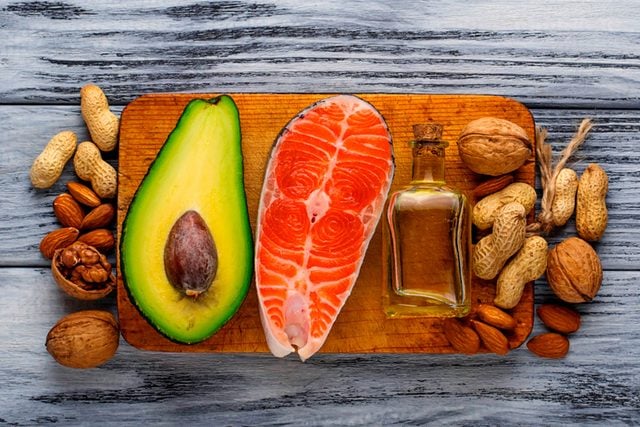
Omega-3 fatty acids make your brain happy
Doctors often know how to calm anxiety, or treat it, with therapy and medications, but the answer to calming the condition could be hiding in plain sight: the foods we eat. Doctors and nutritionists are starting to understand more about how certain nutrients, or lack of them, affect the brain. “Our brain has very high energy and nutrient requirements,” says clinical nutritionist and health coach Melissa Reagan Brunetti, CNC. “Nutritional deficiencies and dietary patterns can affect its function, and alter brain chemistry and the formulation of neurotransmitters—chemicals in the brain that can stimulate and calm.” These neurotransmitters influence our mood as well as our appetite, she says. A study from Ohio State University showed one nutrient that’s especially good for reducing anxious symptoms is omega 3 fatty acids, found in fatty fish like wild salmon, flaxseed, walnuts, and chia seeds. “Our brains need fat from dietary sources to function properly,” Brunetti says. “If you are not eating a sufficient amount of beneficial fats, your brain will suffer.” Be sure to check out these 11 tips from top therapists on how to deal with anxiety.
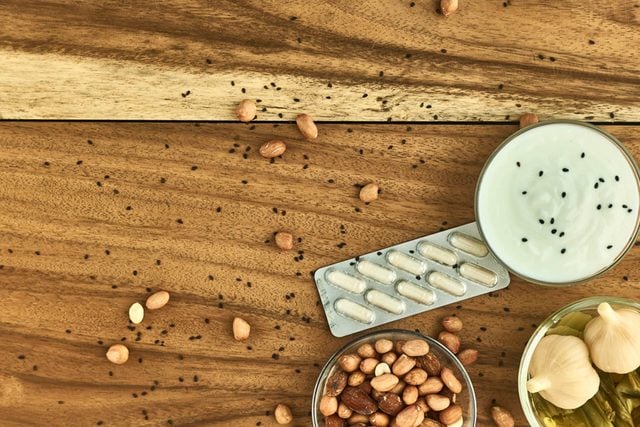
Probiotics are good for the gut
Surprisingly, another calming food source is probiotics. “Your gut bacteria is needed for production of neurotransmitters, including serotonin, dopamine, and GABA [gamma-aminobutyric acid], which all play a role in mood,” Brunetti says. “The microbiome [gut bacteria] has a direct link to the brain and the immune system, so restoring balance in the gut of good and bad bacteria through use of probiotics can benefit the brain.” Recent research has found that probiotics may actually work to treat, or even prevent, anxious feelings. You can either take a probiotic supplement or eat foods that have been fermented, a process which encourages good bacteria to grow, and has been shown in studies as a way how to calm anxiety. “I like to see patients eat more fermented foods like yogurt, sauerkraut, and kefir, as the kinds of bacteria in your gut influence anxiety,” says Drew Ramsey, MD, a psychiatrist who specializes in using dietary changes to help balance moods, and author of Eat Complete. Another fermented food you probably already have in your fridge? Pickles!
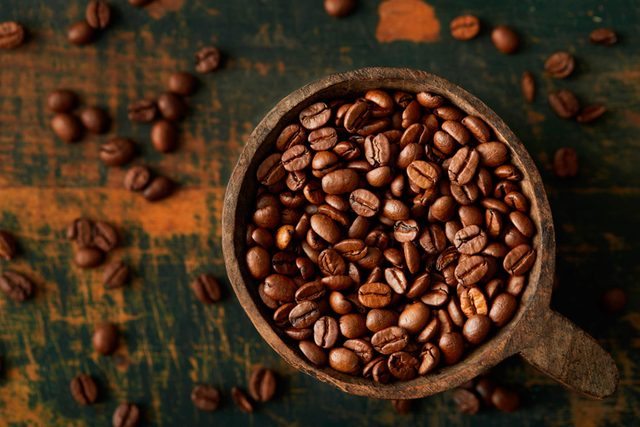
Caffeine makes you anxious
Although some of us feel like we’re miserable until we’ve had our morning cup of java, coffee and other caffeinated foods and drinks actually worsen anxious feelings. Because it’s a stimulant for the nervous system, it increases heart rate, blood pressure, and body temperature. According to the University of Michigan, coffee can lead to symptoms of worrying like nervousness, sweating, and shaking. A study from Brazil found that caffeine actually induced panic attacks in people with an anxious disorder. (Speaking of panic attacks, did you know they can actually be a symptom of ADHD?) Another study, from Wake Forest University, found that caffeine reduced blood flow to the brain by 27 percent. Not to mention that it can mess with sleep, which is essential for brain health. “Limiting caffeine intake can help quell inflammation and contribute to improved brain function,” Brunetti says. Likewise, Dr. Ramsey suggests avoiding energy drinks with caffeine, as well as indulging in too much dark chocolate (stick to one or two squares a day). Have a look at these 16 cartoons people with anxiety will relate to instantly.

Water keeps everything flowing smoothly
How to calm anxiety in one step? Drink good old fashioned water. “Staying hydrated with clean water is very important,” Brunetti says. A study from the University of Connecticut showed that even mild dehydration can cause mood problems. According to the study’s author, Lawrence E. Armstrong, PhD, by the time you feel thirsty it’s too late. “Our thirst sensation doesn’t really appear until we are one or two percent dehydrated,” he says. “By then dehydration is already setting in and starting to impact how our mind and body perform.” The connection behind dehydration and anxious symptoms is not totally known; but the UConn study authors think it may be part of an ancient warning system alerting us to find water for survival. So, you should be sure to consume water throughout the day.

Stay away from refined sugar and processed foods
Sweets and processed foods all are, not surprisingly, bad for your mental health. Sugar and refined carbs cause a spike in blood sugar followed by a sudden drop. A study from Columbia University found that the more refined carbs and sugar women ate, the higher their risk for mood changes and depression. Another study, from the United Kingdom, found that eating processed meat and fried foods had similar responses, possibly because of the link with heart disease and inflammation, which are also associated with mental health problems. “Skip highly processed foods, as these are mainly simple sugars and vegetable oils,” Dr. Ramsey suggests. Instead, try eating more complex carbs like whole grains, which were linked to fewer mental health issues in the Columbia study. These 14 magic phrases can instantly calm your anxiety.
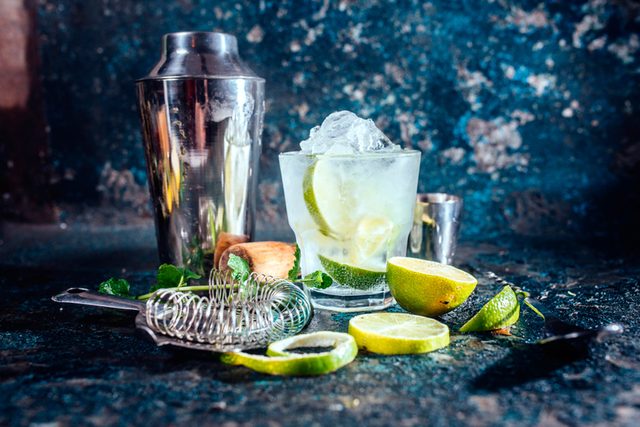
Alcohol brings you down
Alcohol is a depressant but it can also worsen anxiety symptoms. And unfortunately, the two often go hand-in-hand—in a study that took place over 14 years, researchers found that people with social anxiety disorder (SAD) were 4.5 times more likely to develop alcohol dependence. The Anxiety and Depression Association of America says that 20 percent of people with SAD also suffer from alcohol abuse or dependence. Drinking can seem like a good way to calm your nerves, but in reality, it causes spikes and dips in blood sugar, dehydrates you, and causes impaired brain function—all of which can lead to anxious feelings, which then make you want to drink more, creating a vicious cycle. According to the National Institute on Alcohol Abuse and Alcoholism, drinking a lot can cause changes in the brain’s neurotransmitters that may induce these symptoms. For this reason, Brunetti says it’s best to reduce or eliminate alcohol. Be sure you know the 9 signs that you have an anxiety disorder.
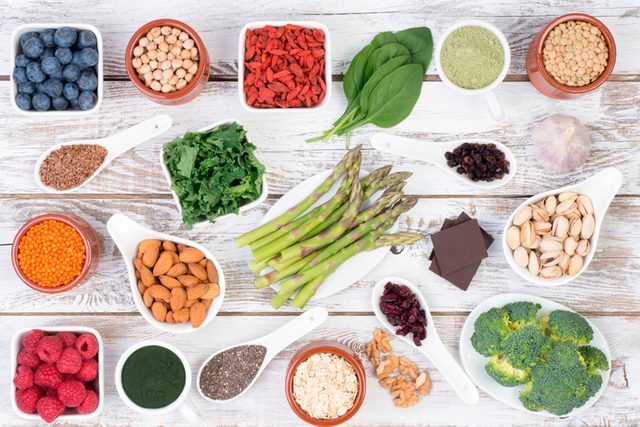
Load up on antioxidants
Here’s another reason antioxidants are superfoods: They can help quell anxious moods. “Antioxidants protect the brain against oxidative stress [free radicals],” Brunetti says. “Oxidative stress leads to inflammation, which can impair neurotransmitter production.” Research by the State University of New York found that anxious symptoms are linked with a lower antioxidant state, and that antioxidants could actually help treat mood issues as well. So which nutrients are antioxidants, and which foods contain them? “Diets rich in beta-carotene like carrots, sweet potatoes, squash, spinach, and kale; vitamin C like citrus fruits, red peppers, Brussels sprouts, broccoli, and strawberries; and vitamin E like almonds, avocado, spinach, sunflower seeds, spinach, and sweet potatoes, are essential for supporting optimal brain function,” Brunetti says. Another powerful antioxidant Brunetti says is shown to combat anxious feelings is the trace mineral selenium, found in Brazil nuts, halibut, grass-fed beef, turkey, chicken, and eggs. Also, studies have shown that upping your zinc, which has antioxidant properties, leads to fewer anxious feelings. Cashews are a great source of zinc. Here are 11 more tips on managing anxiety and panic disorder.
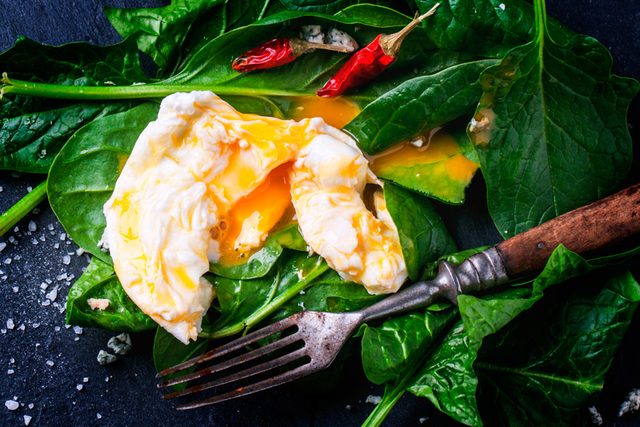
Magnesium is calming
Another nutrient that might stave off anxious symptoms is magnesium. “Magnesium is a calming mineral that has been found to induce relaxation,” Brunetti says. In an Austrian study with mice, diets low in magnesium increased anxious behaviors. Research has shown that magnesium may also help treat mental health issues in humans. According to the University of Maryland Medical Center, inadequate magnesium reduces levels of the neurotransmitter serotonin, and antidepressants have been shown to increase magnesium in the brain—evidence of a positive link. “Magnesium can act at the blood brain barrier to prevent the entrance of stress hormones into the brain,” psychiatrist Emily Deans, MD, writes on Psychology Today. “All these reasons are why I call magnesium ‘the original chill pill.'” Dr. Ramsey suggests eating eggs and greens, like spinach and Swiss chard, for magnesium. Other sources include legumes, nuts, seeds, and avocado.
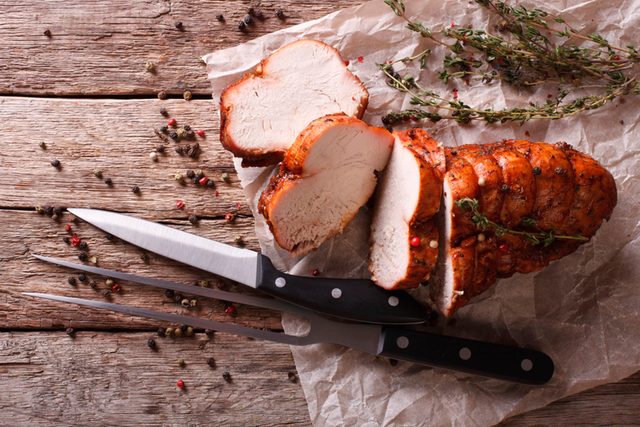
Try tryptophan
We usually think of tryptophan as the nutrient in turkey that puts us to sleep after Thanksgiving—and in fact, tryptophan is an amino acid that the body needs to produce the neurotransmitter serotonin, which helps regulate sleep and moods. According to the University of Michigan, tryptophan may help reduce anxious feelings. In one small study, participants who ate a food bar rich in tryptophan reported fewer symptoms than those who ate a bar without tryptophan. More research is needed, but it seems likely that there is a connection. Tryptophan is in most protein-rich foods like turkey and other meats, nuts, seeds, beans, and eggs. (Incidentally, protein is also important for the production on the neurotransmitter dopamine, which can benefit mood as well.) These are the 7 silent signs of high functioning anxiety.
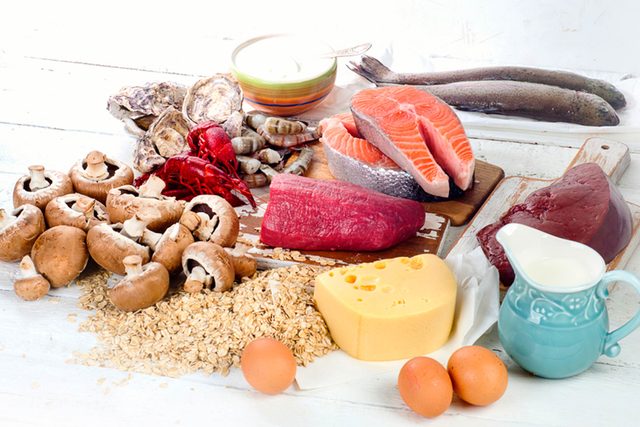
B vitamins bump up good feelings
Harvard Medical School advises eating foods rich in B vitamins, like beef, avocado, and almonds, to help ward off anxious feelings. “B vitamins have positive effects on the nervous system, and deficiencies have been linked to anxious disorders,” Brunetti says. According to the University of Maryland Medical Center, vitamin B6 helps the body make several neurotransmitters, including serotonin, which influence mood. A study from Australia found that stressed-out workers who were given a high dose of B vitamins felt less strained and in a better mood after 12 weeks. Another study, from the University of Miami, found that depressed adults who took a vitamin B complex had fewer depressive and anxious symptoms after two months. “Another nutrient that seems to matter is choline, found in eggs, which is a cousin of B vitamins,” Dr. Ramsey says. More research is needed, but these results are promising.
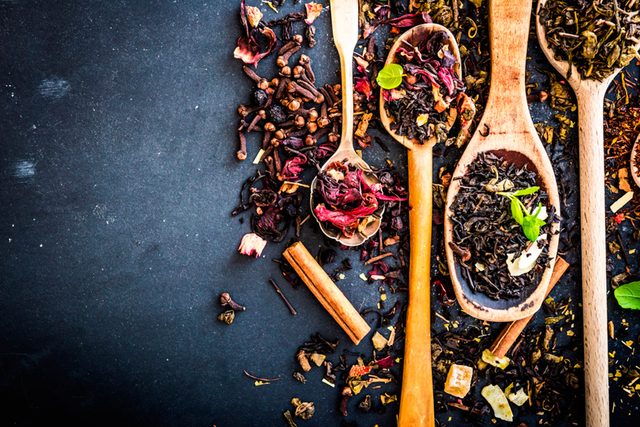
Cozy up with herbal teas
So you might not want to indulge in too much coffee, but you can relax with a mug of herbal tea in order to feel less anxious. “Great options for herbal teas are chamomile, skullcap, and kava kava to start,” Dr. Ramsey says. A study from the University of Pennsylvania found that participants who took chamomile for eight weeks experienced fewer anxious symptoms than those that didn’t. However, be aware that kava can interact with anti-anxiety and antidepressant meds, so talk to your doctor first if you’re on them. Plus, it’s so relaxing that high doses of it could impair your ability to drive, according to one study. If you’re using herbs for anxiety, steer clear of ones that are stimulating, such as ginseng, cautions Dr. Ramsey, because they might actually make anxious feelings worse. These 13 medical conditions could be triggering your anxiety.
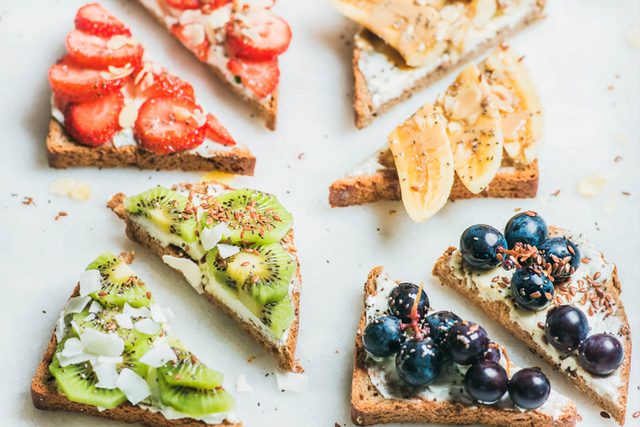
It’s not just what you eat, but how
How to calm anxiety? Pay attention to how and when you eat. Bad habits can have a negative effect on anxious moods, which “get worse when people have low blood sugar,” Dr. Ramsey says. “A simple step people often forget is to eat regularly.” Brunetti says if low blood sugar is an issue for you (in other words, if you get “hangry”), eating smaller, frequent meals throughout the day can help. According to Harvard Medical School, there is evidence that our Western diet, with its focus on refined carbs and processed foods, might not be great for anxious moods; instead, Mediterranean or Japanese diets, which include a lot of veggies and fish, may be the way to go. But, be careful of fad diets that eliminate entire food groups. “Diets that are too low in [complex] carbohydrates can also be detrimental” for anxious feelings, Brunetti says. “Include a variety of foods in your diet to ensure you are getting a wide range of nutrients needed to calm the mind.”
